In 2017 Emory joined the TOME (Toward an Open Monograph Ecosytem) initiative and committed to funding the publication of fifteen open access monographs over five years. TOME is a collaboration of the Association of American Universities (AAU), the Association of Research Libraries (ARL), and the Association of University Presses (AUPresses).
The TOME / Digital Publishing in the Humanities subsidy provides funding to Emory University faculty for the publication of new open access digital monographs that provide evidence of significantly advancing a scholarly question or a field of research. TOME is based at the Fox Center for Humanistic Inquiry within the Emory College of Arts and Sciences, and is supported by a grant from the Andrew W. Mellon Foundation.
This year’s featured authors include Harshita Mruthinti Kamath, Lauren F. Klein, Deboleena Roy, Cynthia Willett, Elizabeth Wilson, and Jacob L. Wright, highlighted here in virtual conversations about their work.
Featured Authors
Impersonations: The Artifice of Brahmin Masculinity in South Indian Dance
by Harshita Mruthinti Kamath
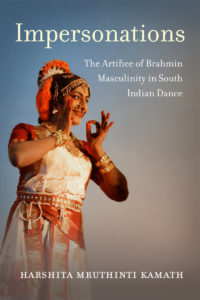 In Impersonations: The Artifice of Brahmin Masculinity in South Indian Dance, Harshita Mruthinti Kamath, Visweswara Rao and Sita Koppaka Assistant Professor in Telugu Culture, Literature and History, focuses on an insular community of Smarta Brahmin men from the Kuchipudi village in Telugu-speaking South India who are required to don stri-vesam (woman’s guise) and impersonate female characters from Hindu religious narratives. Impersonation is not simply a gender performance circumscribed to the Kuchipudi stage, but a practice of power that enables the construction of hegemonic Brahmin masculinity in everyday village life. However, the power of the Brahmin male body in stri-vesam is highly contingent, particularly on account of the expansion of Kuchipudi in the latter half of the twentieth century from a localized village performance to a transnational Indian dance form. The book analyzes the practice of impersonation across a series of boundaries—village to urban, Brahmin to non-Brahmin, hegemonic to non-normative—to explore the artifice of Brahmin masculinity in contemporary South Indian dance.
In Impersonations: The Artifice of Brahmin Masculinity in South Indian Dance, Harshita Mruthinti Kamath, Visweswara Rao and Sita Koppaka Assistant Professor in Telugu Culture, Literature and History, focuses on an insular community of Smarta Brahmin men from the Kuchipudi village in Telugu-speaking South India who are required to don stri-vesam (woman’s guise) and impersonate female characters from Hindu religious narratives. Impersonation is not simply a gender performance circumscribed to the Kuchipudi stage, but a practice of power that enables the construction of hegemonic Brahmin masculinity in everyday village life. However, the power of the Brahmin male body in stri-vesam is highly contingent, particularly on account of the expansion of Kuchipudi in the latter half of the twentieth century from a localized village performance to a transnational Indian dance form. The book analyzes the practice of impersonation across a series of boundaries—village to urban, Brahmin to non-Brahmin, hegemonic to non-normative—to explore the artifice of Brahmin masculinity in contemporary South Indian dance.
Impersonations was published in 2019 by the open access Luminos imprint of the University of California Press, with funding provided by the University of California Press Foundation and the Ahmanson Foundation Endowment Fund in Humanities.
IN CONVERSATION
In celebration of Open Access Week 2020, Harshita Mruthinti Kamath joins her colleague Julio Medina, Assistant Professor of Dance and Movement Studies at Emory University, in a conversation about her book. Their full discussion on September 23, 2020 explores the ways in which Kamath’s research resonates and intersects with Medina’s choreographic work and performance practice.
An Archive of Taste: Race and Eating in the Early United States
by Lauren F. Klein
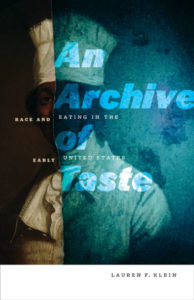 An Archive of Taste: Race and Eating in the Early United States examines the gustatory origins of aesthetic taste in early American literature, showing how thinking about eating can help to tell new stories about the range of people who worked to establish a cultural foundation for the U.S. Lauren F. Klein, Associate Professor in the Departments of English and Quantitative Theory and Methods, reframes the philosophical work of food and its meaning for those who prepare, serve, and consume it.
An Archive of Taste: Race and Eating in the Early United States examines the gustatory origins of aesthetic taste in early American literature, showing how thinking about eating can help to tell new stories about the range of people who worked to establish a cultural foundation for the U.S. Lauren F. Klein, Associate Professor in the Departments of English and Quantitative Theory and Methods, reframes the philosophical work of food and its meaning for those who prepare, serve, and consume it.
An Archive of Taste was published open access in 2020 by the University of Minnesota Press.
.
IN CONVERSATION
In celebration of Open Access Week 2020, Lauren F. Klein joins in conversation with Michael W. Twitty, founder of the blog Afroculinaria and author of The Cooking Gene: A Journey through African American Culinary History in the Old South (Amistad, 2017), which received the James Beard Award for Writing and Book of the Year in 2018. Their full discussion on September 15, 2020 explores the ways in which their unique investigations of culinary history at the nation’s founding intersect with and complement each other.
Molecular Feminisms: Biology, Becomings, and Life in the Lab
by Deboleena Roy
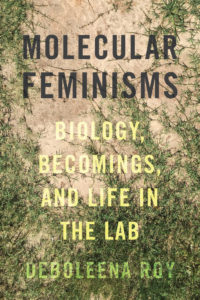 In Molecular Feminisms: Biology, Becomings, and Life in the Lab, Deboleena Roy, Senior Associate Dean at Emory College of Arts and Sciences, and Professor of Neuroscience and Behavioral Biology (NBB) and Women’s, Gender, and Sexuality Studies (WGSS), investigates science as feminism at the lab bench, engaging in an interdisciplinary conversation between molecular biology, Deleuzian philosophies, posthumanism, and postcolonial and decolonial studies. She brings insights from feminist theory together with lessons learned from bacteria, subcloning, and synthetic biology, arguing that renewed interest in matter and materiality must be accompanied by a feminist rethinking of scientific research methods and techniques.
In Molecular Feminisms: Biology, Becomings, and Life in the Lab, Deboleena Roy, Senior Associate Dean at Emory College of Arts and Sciences, and Professor of Neuroscience and Behavioral Biology (NBB) and Women’s, Gender, and Sexuality Studies (WGSS), investigates science as feminism at the lab bench, engaging in an interdisciplinary conversation between molecular biology, Deleuzian philosophies, posthumanism, and postcolonial and decolonial studies. She brings insights from feminist theory together with lessons learned from bacteria, subcloning, and synthetic biology, arguing that renewed interest in matter and materiality must be accompanied by a feminist rethinking of scientific research methods and techniques.
Molecular Feminisms was published open access in 2018 by the University of Washington Press.
IN CONVERSATION
In celebration of Open Access Week 2020, Deboleena Roy joins in conversation with Tuomas A. Laitinen, an artist based in Helsinki, Finland, who works with moving image, sound, light, glass, chemical, and microbial processes, as well as algorithms, to explore the entanglements of multispecies coexistence. Their full discussion on October 11, 2020 explores the ways in which their unique investigations and practices resonate and intersect.
Uproarious: How Feminists and Other Subversive Comics Speak Truth
by Cynthia Willett and Julia Willett
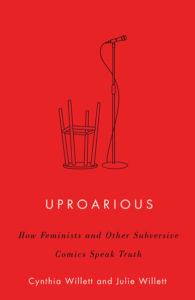 Placing theorists in conversation with comedians, Uproarious: How Feminists and Other Subversive Comics Speak Truth offers a full-frontal approach to the very foundation of comedy and its profound political impact. Cynthia Willett, Samuel Candler Dobbs Professor of Philosophy at Emory University, and Julie Willett, Associate Professor and Director of Undergraduate Studies in the Department of History at Texas Tech University, address the four major theories of humor—superiority, relief, incongruity, and social play—through the lens of feminist and game-changing comics Wanda Sykes, Margaret Cho, Hannah Gadsby, Hari Kondabolu, and Tig Notaro.
Placing theorists in conversation with comedians, Uproarious: How Feminists and Other Subversive Comics Speak Truth offers a full-frontal approach to the very foundation of comedy and its profound political impact. Cynthia Willett, Samuel Candler Dobbs Professor of Philosophy at Emory University, and Julie Willett, Associate Professor and Director of Undergraduate Studies in the Department of History at Texas Tech University, address the four major theories of humor—superiority, relief, incongruity, and social play—through the lens of feminist and game-changing comics Wanda Sykes, Margaret Cho, Hannah Gadsby, Hari Kondabolu, and Tig Notaro.
Uproarious was published open access in 2019 by the University of Minnesota Press.
IN CONVERSATION
In celebration of Open Access Week 2020, Cynthia Willett joins J Finley, Assistant Professor of American Studies and Gender, Sexuality & Feminist Studies at Middlebury College, in a conversation about Willett’s book. Their full discussion on September 23, 2020 explores the ways in which Willett’s research resonates and intersects with Finley’s research and performance practice as a stand-up comedian.
A Silvan Tomkins Handbook: Foundations for Affect Theory
by Adam J. Frank and Elizabeth A. Wilson
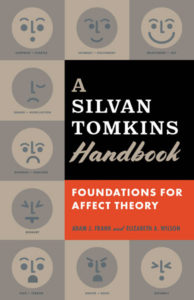 The brilliant and complex theories of psychologist Silvan Tomkins (1911–1991) have inspired the turn to affect in the humanities, social sciences, and elsewhere. Nevertheless, these theories are not well understood. With their extensive experience engaging and teaching Tomkins’s work, Adam J. Frank, Professor in the Department of English Language and Literatures at the University of British Columbia, and Elizabeth A. Wilson, Samuel Candler Dobbs Professor in the Department of Women’s, Gender, and Sexuality Studies, provide a user-friendly guide for readers who want to know more about the foundations of affect studies.
The brilliant and complex theories of psychologist Silvan Tomkins (1911–1991) have inspired the turn to affect in the humanities, social sciences, and elsewhere. Nevertheless, these theories are not well understood. With their extensive experience engaging and teaching Tomkins’s work, Adam J. Frank, Professor in the Department of English Language and Literatures at the University of British Columbia, and Elizabeth A. Wilson, Samuel Candler Dobbs Professor in the Department of Women’s, Gender, and Sexuality Studies, provide a user-friendly guide for readers who want to know more about the foundations of affect studies.
A Silvan Tomkins Handbook: Foundations for Affect Theory was published open access in 2020 by the University of Minnesota Press.
IN CONVERSATION
In celebration of Open Access Week 2020, Elizabeth Wilson joins her coauthor Adam Frank and Joey Orr, Andrew W. Mellon Curator for Research, Integrated Arts Research Initiative (IARI), Spencer Museum of Art, in a conversation about A Silvan Tomkins Handbook. Their full discussion on September 29, 2020 explores the ways in which Wilson and Frank’s book, and Tomkins’s theory of affect, intersect with Orr’s curatorial practice.
War, Memory, and National Identity in the Hebrew Bible
by Jacob L. Wright
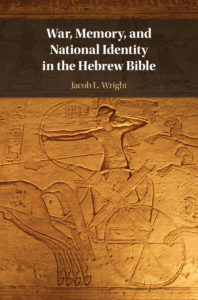 The Hebrew Bible is permeated with depictions of military conflicts that have profoundly shaped the way many think about war. Why does war occupy so much space in the Bible? In this book, Jacob Wright, Associate Professor of Hebrew Bible, Candler School of Theology, and associate faculty member at the Center for the Study of Law and Religion, offers a fresh and fascinating response to this question: War pervades the Bible not because ancient Israel was governed by religious factors (such as “holy war”) or because this people, along with its neighbors in the ancient Near East, was especially bellicose. Instead, the reason is rather that the Bible is fundamentally a project of constructing a new national identity for Israel, one that can both transcend deep divisions within the population and withstand military conquest by imperial armies. Drawing on the intriguing interdisciplinary research on war commemoration, Wright shows how biblical authors, like the architects of national identities from more recent times, constructed identity in direct relation to memories of war, both real and imagined.
The Hebrew Bible is permeated with depictions of military conflicts that have profoundly shaped the way many think about war. Why does war occupy so much space in the Bible? In this book, Jacob Wright, Associate Professor of Hebrew Bible, Candler School of Theology, and associate faculty member at the Center for the Study of Law and Religion, offers a fresh and fascinating response to this question: War pervades the Bible not because ancient Israel was governed by religious factors (such as “holy war”) or because this people, along with its neighbors in the ancient Near East, was especially bellicose. Instead, the reason is rather that the Bible is fundamentally a project of constructing a new national identity for Israel, one that can both transcend deep divisions within the population and withstand military conquest by imperial armies. Drawing on the intriguing interdisciplinary research on war commemoration, Wright shows how biblical authors, like the architects of national identities from more recent times, constructed identity in direct relation to memories of war, both real and imagined.
War, Memory, and National Identity in the Hebrew Bible was published open access in 2020 by Cambridge University Press.
Recent Comments